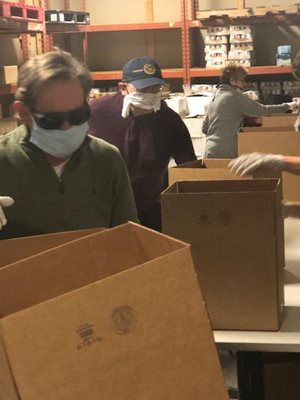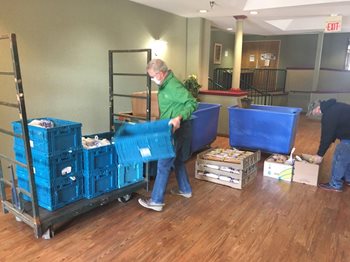Older residents living in the communities built and maintained by St. Mary Development in Dayton, Ohio, were afraid to leave home – and had been advised not to. They were concerned about public transportation. They were advised not to go to grocery stores. But they needed food. A number of organizations partnered to get it to them.
"We develop affordable housing for seniors and connect them to services," says Tim Bete, president of St. Mary's, a NeighborWorks network organization. "Like a lot of nonprofits, we’ve never really had a robust volunteer program."
But when COVID-19 hit, St. Mary had to pull service coordinators out of the buildings. Normally, they conducted one-on-one meetings – an average of 170 a month – to solve problems. After COVID, "in two weeks, they made 900 calls to residents," Bete says. "Food insecurity was always a big issue." During the shelter-in-place order, it was worse.
 Bete says they knew that the Dayton Food Bank had food. And they had a longtime relationship with St. Vincent de Paul, an agency with a pantry. They needed volunteers to pack the boxes, though. And they needed volunteers to deliver them to residents.
Bete says they knew that the Dayton Food Bank had food. And they had a longtime relationship with St. Vincent de Paul, an agency with a pantry. They needed volunteers to pack the boxes, though. And they needed volunteers to deliver them to residents.
The two organizations worked with Declare, a nonprofit, that put out the word among faith-based communities. Suddenly, Bete says, there was a small army of volunteers ready to do the work. His daughter was among them.
"Declare has been working with multiple churches and organizations in the area, as well as utilizing our website to pull in volunteers," says Kelly Cappoen, communications coordinator. "We also have a bank of about 1,300 volunteers who helped us last year with a citywide cleanup, as well as tornado cleanup and relief. When they heard about the food shortage needs in our area, many were quick to respond to try to meet that need." Since the beginning of March, Cappoen says they’ve worked with well over 200 volunteers and various organizations, including St. Mary's, to distribute food to those in need.
 "We’ve been able to get food out and to keep people in," Bete says. The partnerships, he says, "responds to each organization’s strengths."
"We’ve been able to get food out and to keep people in," Bete says. The partnerships, he says, "responds to each organization’s strengths."
St. Mary’s strength, aside from housing? "We know the residents," he says. "We know who’s hungry."
Bete believes that even after the stay-at-home orders have ceased, the partnerships will continue. "I think this is going to change for the long-term how food delivery is done for people in need," he says. "If you have to go to a food pantry, that might mean you have to have a car or be mobile. Most of our residents have mobility issues. They can’t pick up a 30-pound box and walk home with it."
With food distribution under control, St. Mary is trying to help residents with other problems. They’ve ordered masks for everybody. They’re also putting together bags of materials to keep residents entertained while confined.
"We’re giving all of our residents a blank journal with a sheet about the benefits of journaling," he says. Other materials include puzzles, exercise ideas and spiritual reading "We’re trying to focus on the mental and spiritual health side of things," Bete says. "We don’t think this is going to be over quickly for our residents."
05/06/2020

